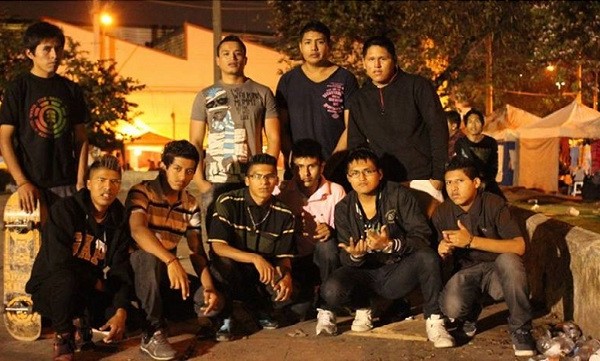
Denílson and other teenagers meet one Sunday at the Kantuta fairground, a meeting point for the Bolivian community in São Paulo. Photo: Agência Pública
Alice Riff and Luciano Onça, was originally published by on].
Denílson Mamami, aged 15, lives in Bom Retiro, a central district of São Paulo. Like all young men of his age, he dreams of going to university, having a good career, making his mother proud, getting married and having children. He is studying at the João Kopcke state school, also in the centre, a few metres away from the Júlio Prestes station. He likes hanging out with his girlfriend and meeting his friends to listen and compose romantic and hip hop songs. But Denílson – known as “Choco” – along with one-third of the pupils at his school, was born in Bolivia. He has lived in Brazil since he was 9 years old. Like him, thousands of Bolivian teenagers, or children of Bolivian immigrants, currently live in São Paulo.
The association ‘Pastoral do imigrante’ estimates that the Bolivian population of São Paulo is between 50,000 and 200,000 (a figure which cannot be confirmed as many are in an irregular situation). The vast majority work in sewing workshops located throughout the city, but which are concentrated in central districts such as Brás and Bom Retiro. The Bolivian community is considered to be the biggest community of Latin-Americans resident in Brazil. In 2010, when the Lula government granted an amnesty to the country's irregular immigrants, of 42,000 requests for naturalisation, more than 17,000 came from Bolivian citizens.
Choco's parents came to Brazil 15 years ago in search of job opportunities. During his childhood he was cared for by his grandmother in La Paz, Bolivia's capital, while his parents sought to establish themselves in São Paulo as seamsters. When he was just 9 years of age, his mother, now separated from his father, went to bring him from Bolivia to live with her in the Bom Retiro district, where they live and work in the same room of an old multi-story house which they share with other Bolivian families. In the house's living room there is a sewing workshop, where the adults work very long days.
São Paulo's Bolivian seamsters have achieved visibility in the media following various complaints of workshops which kept immigrants in conditions akin to slavery. But the mini-documentary 100% Boliviano, mano sought to investigate the way of life of the second generation of Bolivians who live in the city. Against a backdrop of daily prejudice – pejoratively called “Indians” or “Bolivias”, they describe a day-to-day life of physical and verbal attacks – they share their desire to remain in Brazil and to avoid working in the sewing industry.
Watch the video which was produced by Pública, a partnership with Grão Filmes, and shown in the 4th series of the programme Sala de Notícias on Canal Futura.







3 comments
Todos nós somos imigrantes.A humanidade toda veio da Africa.Quanto mais pessoas queiram vir pra cá melhor, todos ganham com isso.Todos são bem vindos, ou pelo menos deveriam ser.Cada cultura que chega tras um pouco dela e isso só torna o lugar melhor.A humanidade é quase toda boa, os políticos ;e que estragam.Por mim,nem existiria fronteira.
Todos nós somos imigrantes.A humanidade toda veio da Africa.Quanto mais pessoas queiram vir pra cá melhor, todos ganham com isso.Todos são bem vindos, ou pelo menos deveriam ser.Cada cultura que chega traz um pouco dela e isso só torna o lugar melhor.A humanidade é quase toda boa, os políticos ;e que estragam.Por mim,nem existiria fronteira.